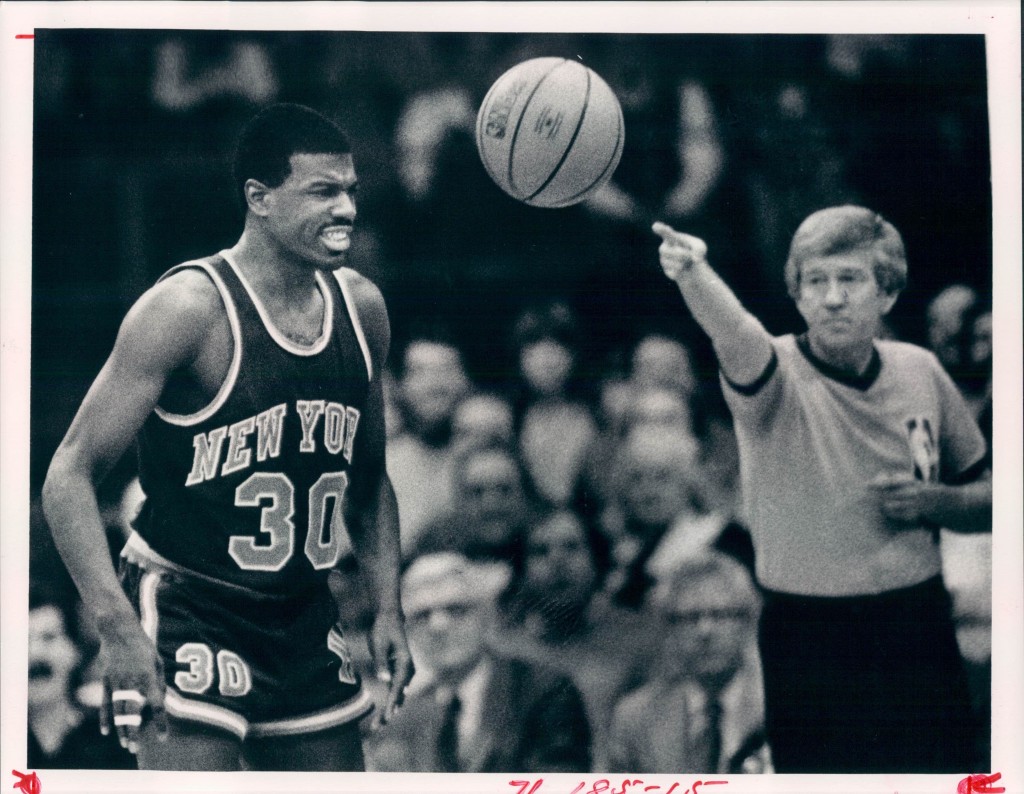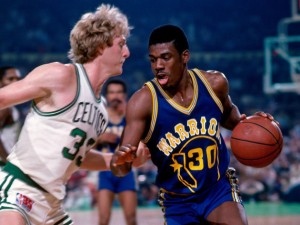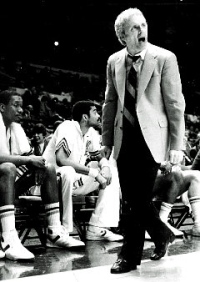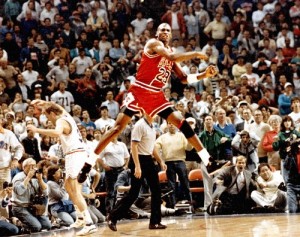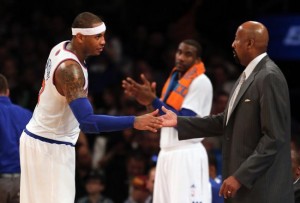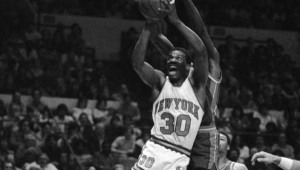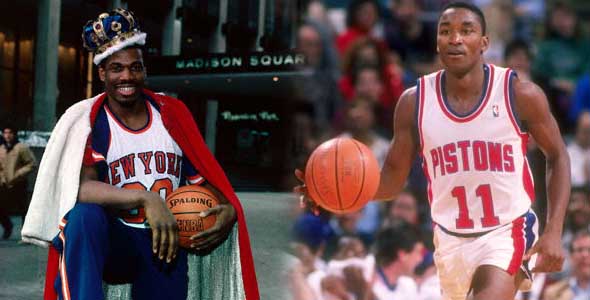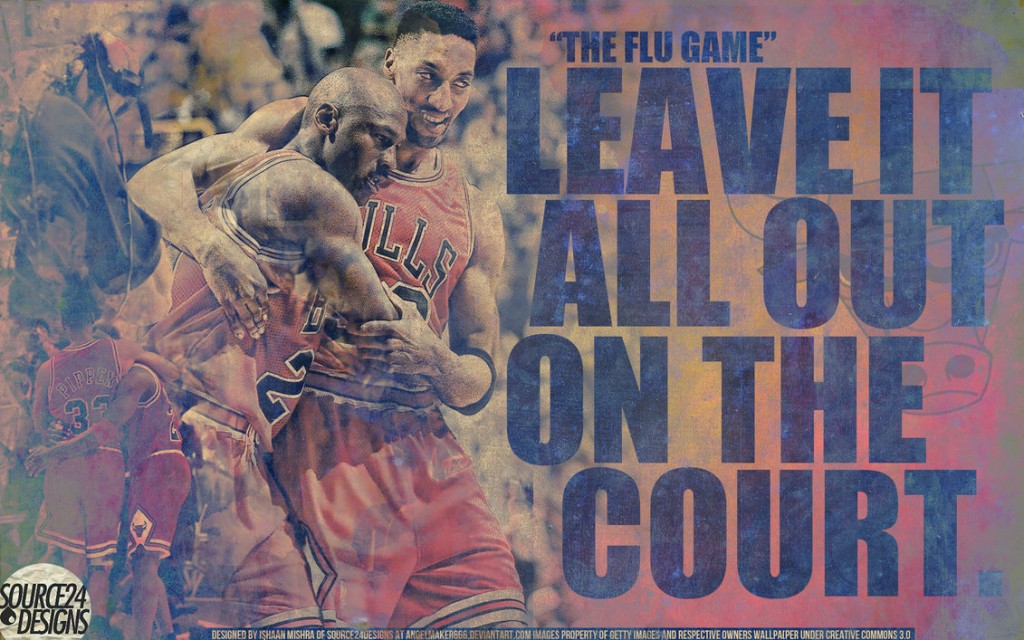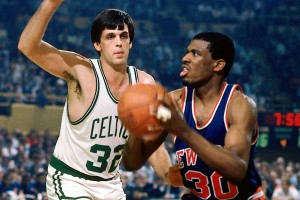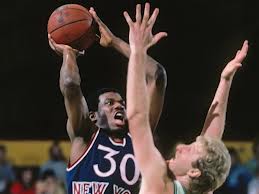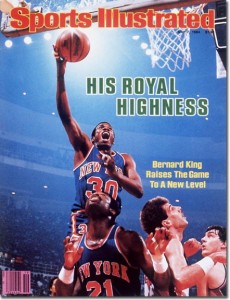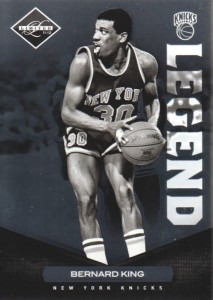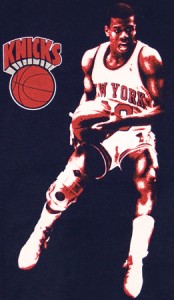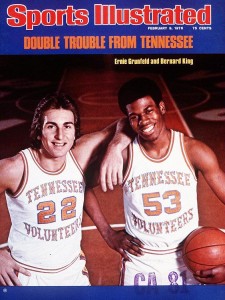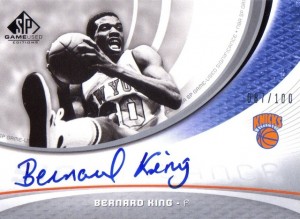By Charles Modiano
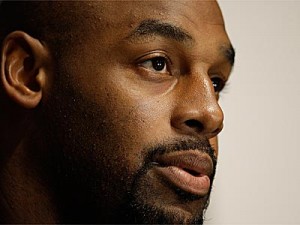
Donovan McNabb is still seeking an NFL job, and never before in NFL history has a quarterback so accomplished found himself so suddenly unemployed. In quieter news, 31-year old quarterback John Beck made the Houston Texans team despite an 0-7 career record with a 67.6 passer rating. In the NFL, there are no white versions of McNabb’s free-fall or African-American versions of Beck’s remarkable life preserver. There are also no Black Tim Tebows or White Vince Youngs (out of league despite 31-19 starter record). After five years of failure, Alex Smith’s redemption is positively heartwarming — until you realize he can only be white. Hasn’t McNabb earned Smith’s respect?
In the famous Harvard study: “Are Emily and Greg More Employable Than Lakisha and Jamal?”, resumes with White-sounding names received 50% more callbacks than identical resumes with Black-sounding names. As McNabb awaits callbacks, exactly how and why Rex Grossman and Caleb Hanie became more employable than Donovan McNabb in 2010 and 2011 demands a fuller explanation. Unlike the 2010 seasons of Alex and Troy Smith (out-of-league), these resumes aren’t quite identical. A closer look at Rex’s rise and Caleb’s climb not only reveals an NFL system of white privilege for quarterbacks, but more significantly[1], it reflects how hidden forms of employment discrimination routinely operate across America.
How did we get here? Houston head coach Gary Kubiak explains his hiring of John Beck:
“[Beck] gives us some security here. He knows our system moving forward.”
Yes, John Beck knows Gary Kubiak’s “system”. Here is why:
As a longtime assistant coach, Gary once learned “the system” under head coach Mike Shanahan with The Broncos before he hired Mike’s son Kyle to help employ “the system” with The Texans before Kyle left to join Dad to teach “the system” to Beck with The Redskins. In April, Beck was cut by Mike, but still learned “the system” just well enough to be signed two weeks later by his friend Gary.
Did you get all of that Mr. McNabb?
While Donovan’s critics like to unfairly obsess over each under-thrown pass [2], his alleged demise has been falsely exaggerated by any objective measure or historical comparison. McNabb completed 19 of 24 passes in his final game played (with two drops), his 2011 passer rating surpassed 15 other starting QB’s, and his last two teams combined for an 8-21 record after he left.
While his 2011 break with The Minnesota Vikings can be reasonably justified [3], the choices by coaches Mike Martz and Mike Shanahan were both indefensible and instructive. However, the minds of Mike and Mike tell an interwoven NFL story about the power of “genius” white coaches, “sticky” Black stereotypes, and a complex system of white privilege. Lets review:
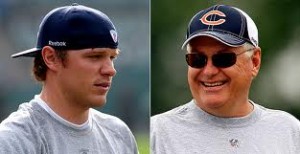
1) “The System”: Why Mike Martz Chose Caleb Hanie
Following the 2011 season, longtime Chicago Bears General Manager Jerry Angelo was fired, and celebrity Offensive Coordinator Mike Martz “resigned” at the end of his contract citing “philosophical differences” with head coach Lovie Smith. Here is why: After quarterback Jay Cutler suffered a season-ending injury, the 7-3 Bears allowed undrafted and untested Caleb Hanie to steer their playoff ship although he had never started a single NFL game. As Hanie insurance, The Bears also picked up Josh McCown who had been out of the league and coaching high school football.
How did these men become qualified? They both knew Mike Martz and his offensive “system”[4]. Meanwhile, McNabb requested his Vikings release with the very specific hopes for a Chicago homecoming. To many Bears fans, the low-turnover McNabb running a ball-control offense on a defense-first Bears was an absolute no-brainer — just not the brain of Mike Martz.
Knowledge of Martz’s system trumped actual skill, and head coach Lovie Smith[5] made the mistake of deferring to Martz – the man who once gave Smith his first defensive coordinator position a decade earlier. As the former Offensive Coordinator of the 1999 Super Bowl Champion Rams, Martz had been credited as the architect and “genius” behind of “The Greatest Show on Turf”. By 2001, Martz became the Rams head coach and notably gave the Super Bowl away to the underdog Patriots. In Too S’Martz for His Own Good, the late great Ralph Wiley wrote:
These would-be football geniuses kill me. Don’t they kill you?
They come along now and then, like Mr. Mike Martz. Before the game teaches them the basic humility needed for any martial art, you can almost hear ‘em thinking, “Oooo, my system is so smooth. Oooo, lookit. I made separation. I made open space. I. I. I. My scheme is so sweet.”
Know who’s next in line? Spurrier. And we encourage them. Media types. “Brilliant scheme. Yada-yada.”
…Because you knew the Rams would throw it.
That ain’t genius. It’s ego, run amok.
Genius in football is simpler than that.
It’s not exploding receivers out of set like quail out of a covey.
In football, genius is simple: Do what they don’t expect you to do.
If they expect you to run, pass. If they expect you to pass, run.
Ten years later, genius in football was as simple as picking Donovan over Caleb Hanie.
But Martz never learned.
While the Rams Hall-of-Fame talent like Kurt Warner, Marshall Faulk, and Isaac Bruce could turn countless coaches into Einstein, Caleb’s familiarity with Martz’s “system” produced four straight abysmal losses low-lighted by an anemic 41.8% QB rating – half that of McNabb in 2011.
Why did Martz believe he could turn Hanie into Kurt Warner?: Because he still believed he turned Warner into Warner! Speaking of the former stock boy turned MVP, Martz remarked: “You all know the story about the grocery clerk, right?” Warner wasn’t “Cinderella”, that was Martz.
Distracting media discussions on Martz “system” replaced a very simple question: If Denver coach John Fox can completely overhaul his career-long system in a single week to accommodate a 46.5% passer named Tebow, why can’t Mike Martz adjust his for a 6-time all-pro?
Hadn’t McNabb earned Tebow’s respect?
Instead, the “system” has indirectly become one of the NFL’s greatest systems of white privilege that rewards quarterback-ups and has-beens. Predominantly white coaches create systems that often reward predominantly white quarterbacks, their past personal relationships, and the perceived ability to employ their playbooks. This perceived ability comes at a cost frequently chronicled by Black Athlete Sports Network and The Starting Five. BASN’s Gary Gray asks:
“Over 65% of college quarterbacks are African American. What happened? Do these men forget how to play the position when they enter the pro level?”
TSF’s Michael Tillery also sees a systemic problem:
“The system of evaluating quarterbacks should be based on merit and not what our perception of what a quarterback should be.”
The great irony is that adherence to “the system” is often a statement on the coach’s own intellectual inability to adapt to player talent. McNabb agrees:
“I thought the Bears would call. So many people continuously talked about the Mike Martz offense… If you want to win and win now, you go out and get a better quarterback and you cater your offense to his strengths, and obviously the strengths of your team.”
Unfortunately for McNabb, Martz was not alone. Sticky stereotypes from his previous year with The Redskins may have also come roaring back. On talk radio, the refrain went a little something like this: “Well if McNabb can’t even grasp the rigors of Shanahan’s two-minute drill, then how will he pick up Martz’s complex playbook!”

2) “Sticky Stereotypes”: Why Mike Shanahan Won the War
The root of Donovan McNabb’s downfall began with Kyle Shanahan – the Redskins Offensive Coordinator who never really wanted him. Kyle shared Martz’s inflexibility and sense of entitlement, but not his resume. As a poster boy for affirmative action, Kyle obtained all four of his coaching jobs through his Dad by the age of 30.
Kyle would sour on McNabb almost immediately in 2010, and prefer Rex Grossman because he knew Kyle’s “system” from their previous year with the Texans. Like Martz, Kyle either wouldn’t or couldn’t adapt to fit into McNabb’s superior strengths, as Eagles coach Andy Reid once did for McNabb, and then once again for Michael Vick. Kyle’s flaws and family ties would quickly become Donovan’s burden.
Humiliation #1: Rex Grossman ”gave us the best chance to win”.
The Washington Redskins were 4-3 in 2010 and head coach Mike Shanahan famously benched McNabb at the end of a winnable game in favor of Grossman who fumbled the game away on first play. Kyle likely made initial benching call. Afterward, ex-coach Tony Dungy reacted:
“If I’m Donovan McNabb, I’m hot. I’m your starting quarterback. As a coach, I can’t take you out of a game we have a chance to win if I believe in you.”
Humiliations #2 and #3: Too dumb and lazy
Instead of admitting his terrible error, Mike Shanahan humiliated McNabb twice more by criticizing both his mental and physical ability to run the 2-minute drill. Shanahan’s actions were strongly denounced by many former coaches and quarterbacks (see Jimmy Johnson and Terry Bradshaw). Critics called Shanahan’s actions “completely dumb” and “personal, intended to injure McNabb’s reputation”, and more charged that “the race card had officially been dealt” with “racial coding… [worthy of] firing a coach” as Shanahan “knowingly treated McNabb like a N-—”. McNabb reflected back in 2011:
“When you start to challenge my intelligence, you’re gonna challenge my manhood, everything that I’ve been able to accomplish throughout the years, that’s disrespectful.”
But Shanahan did far more than challenge his intelligence — he challenged his long-term future employment prospects. Shanahan’s “reference” wasn’t just an individual attack – it was institutional. For an African-American quarterback in a league that has a long and continuing history of devaluing Black intelligence at the QB position, being essentially called “dumb” and “lazy” is like a felony conviction to be seen on all future job applications.
Never mind McNabb’s 92-59 record with the Eagles; his five NFC championship games; or that a closer look at Shanahan’s coaching career reveals far more “Trent Dilfer”[7] than “John Elway”. If Mike Shanahan questioned McNabb’s intelligence, then sports media repeats it, sports radio debates it, and then it becomes fact.
Humiliation #4: Shanahan chooses Beck over McNabb
Not long after Mike Shanahan declared he would only welcome McNabb as a “back-up” in 2011, he had automatically granted John Beck the opportunity to compete for The Redskins starting job with Grossman. Both Shanahans saw something very special in Beck. Kyle stood on a table in 2007 insisting Beck be drafted with the 11th pick, and Mike effusively praised him and stated: “I think the world of him”. Whatever Mike saw in Beck would trump McNabb’s 107 – 0 advantage in career wins.
Beck would go 0-3, the “Beck-Rexperiment” would produce a 6-13 record in 2010-11, and Shanahan would quietly admit defeat sans apology. He would cut Beck, and trade a bunch of Redskins draft picks for super-prospect-in-any-system Robert Griffin III. Mike would keep his job, keep his son, keep his ego, and possibly even restore his genius. RG3 might soon make all but McNabb forget:
Rex failed. Beck failed. Kyle’s system failed. Mike’s judgement failed. And no “system” will ever turn Rex or Beck into Elway.
Humiliation #5: League chooses Shanahan over McNabb
In this copy-cat league, McNabb’s past pass-ups justify future pass-ups. This writer displays the popular circular logic:
“All I have to say is this, the Texans and Bears both lost their quarterback mid-season in 2011, and they still didn’t give McNabb a call. What does that tell you?”
Two simple explanations are Martz’s egomania and the decades-long Kubiak-Shanahan friendship, but that was not the author’s point.
Hiring McNabb now must first require the mental capacity to acknowledge that the genius Mikes were dead wrong, and Donovan was right. Too many fellow GMs, coaches and complicit media members are incapable of drawing this conclusion, no matter how many stats, dumb decisions, or reels of Caleb Hanie videotape turn up. None of these facts are more powerful than their belief in the “genius white coach” – a myth enabled by a sports media that can’t seem to apply such labels to the Tony Dungys or Mike Tomlins[6].
The quarterback decisions of Shanahan and Martz weren’t merely “incompetent” — but constituted coaching malpractice. What if McNabb was white? What if Rex-Beck were Black? Is Martz just an equal-opportunity egomaniac? While we can and should ask these questions, the answers still miss the systemic point. Institutional racism is not about Martz or Shanahan. It’s about the incredible widespread trust in their judgment which is inseparable from their own whiteness.
That’s why Donovan McNabb remains unemployed.
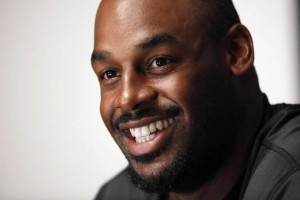
3) “It’s Bigger Than McNabb”: The Real Problem
“I’m not training to be a backup in this league. … I want to be the guy out there battling and going through the ups and downs. I want to be that guy.”
Many in media have argued that McNabb needs to get a “grip on reality” and tone down his lofty expectations of ever competing for an NFL starter position. But the quote above is not from McNabb, but John Beck who just naturally expects to receive what McNabb has spent a Hall-of-Fame career (see Jim Kelly) pursuing:
Respect.
The real problem is not with McNabb, but with those coaches, writers, and fans who have the audacity to expect more “humility” from McNabb than the John Becks. Donovan has eyes, and can see the suffocating white privilege all around him from John to Rex to Caleb to Josh to Kyle to Mike and at least 50 QB’s who know all about “systems” their arms can’t cash. He clearly sees that his accolades haven’t gained him half the line of credit of Kerry Collins or Todd Collins. McNabb sees all of this. The real problem in the NFL, sports media, and America is this:
Friends Trump Facts: McNabb never built up a “coach’s friends network”[8] like Beck. In America, 70-80% of all jobs are obtained through “networking” – the most common mass form of employment discrimination. This “hidden job market” produces “hidden white privilege” as bosses naturally tend to hire family, friends and others who look, think, and act like them. Kyle Shanahan is more rule than exception. I have also benefited from networking. I earned my very first job as a teen through my Aunt, my first career opportunity through my brother, and when I messed up like Kyle, I didn’t have my intelligence questioned.
System Trumps Skill: Caleb over Donovan is not abnormal. In corporate America, “the system” is called “corporate culture” and “fitting in” to existing white cultural norms is preferred to maximizing the skills of more qualified employees of color. Whites are also more likely to have their specific individual strengths noticed and nourished (see Tebow). Studies also show that an African-American male with a Bachelor’s degree is just as likely to be unemployed as a white male with a high school diploma (slide #10). As a white college graduate, if I really wanted to identify with the employment barriers of college-educated African-Americans, I’d have to return my degree.
Stereotypes Trump Stats: Shanahan’s stereotype – not McNabb’s resume – stuck like glue. Such stigmas and stereotypes do not stick equally (see Kerry Collins’ transgressions). Princeton studies also reveal that a white man with a felony conviction has an equal or better chance at employment than a Black man without one. As a white job seeker, if I really wanted to understand Black employment challenges, I’d have to mug somebody and do time first.
Ego Trumps Winning: Don’t coaches like Shanahan, Martz, and others “just want to win football games”? No. Not quite. Ego-maniacal NFL coaches (which are most) want to win games, win their way, and receive the credit for the victories. I have also held jobs where only 30% of my skill set was being used, and my worth was being (mis)judged because my strengths were ignored. While incredibly frustrating, it still did not stop me from obtaining other jobs within my profession.
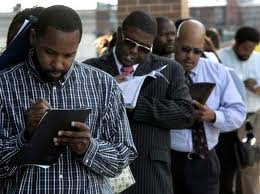
Conclusion:
In arguing the case of white quarterback privilege, the most common resistance has come through variations of the following “common-sense” question:
“In a billion-dollar enterprise, wouldn’t any team definitely hire the best quarterback that could help their team win?”
Problem #1 with the question: It assumes winning is always more valuable than whiteness as the face of a franchise. While elite talents like Vick, RG3, and Cam Newton will always find homes, Michael Tillery asks the opposite economic question: “Is the fear Black quarterbacks will take over the league alarming enough there will always be resistance for the status quo to submit to their physical and mental prowess and unequivocally give them a shot?”
Problem #2 is sports history: The “wouldn’t any team help itself?” logic has long been an enabling tool in justifying discrimination. It once helped deny Black players from entering Major League Baseball as The Sporting News editorialized in 1945: “There is not a single Negro player with Major League possibilities.” The white press, white fans, and owners at the time largely accepted this reasoning at the expense of pennants and millions in ticket sales (see Brooklyn Dodgers).
More recently, this question was turned on its head when the collective judgment of all 30 NBA General Managers refused to draft or sign Jeremy Lin because they subconsciously perceived stereotype before skill. In linking Asian to African-American stereotypes, David J. Leonard writes: “Race matters when thinking about Lin’s recruitment (or lack thereof) out of high school and his path to the NBA, as race matters when talking about employment discrimination.”
In the intentional scenario, McNabb is being black-balled like Satchel Paige, Curt Flood, and Barry Bonds (see 2008) before him. In the unintentional scenario, McNabb is this year’s Jeremy Lin before the Linsanity. In either case, the racial impact is just the same (cue Jay Smooth).
Donovan McNabb is the story of employment discrimination and white affirmative action in America.
But just don’t tell John Beck “the system” is rigged. He believes he earned his job.
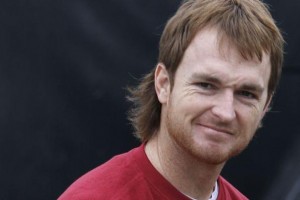
Charles Modiano of POPSspot.com, for War Room Sports
[1] Beyond stereotypes based on intelligence that discriminate against African-American QB’s, many have argued that stereotypes based on athleticism have discriminated against white players at “skill positions” – even if not near a McNabb level. Stereotype research suggests that this is also likely true to some degree. While anything less than a meritocracy at any position should be corrected, such bias would not be symbolic of any widespread racial discrimination that happens in the everyday lives of whites. Employment research indicates that people of color are discriminated against in all positions at every level. If for example, athletic stereotypes on physicality were preventing whites from gaining fair access to hard labor blue-collar jobs, then that stereotype would gain far greater importance. However
, the exact opposite is true. White
Quarterback Privilege is especially significant precisely because it mirrors institutional white privilege in employment prevalent across society that is founded on the notions of white male supremacy in intelligence and leadership. This real-world context is the foundation that inspired this article.
[2] McNabb often underthrows the ball when missing receivers, which visually appears far worse than sailing overthrows. This is a strength disguised as a weakness as missing low over high prevents interceptions (only two in 2011). This is one reason why McNabb has the second best
touchdown-to interception ratio in NFL history (behind Tom Brady).
[3] Some have misused Christian Ponder’s promotion to Viking starter by head coach Leslie Frazier to indicate that McNabb was “beaten out” by a rookie. This is false. Ponder went 1-7 with a 70.1 passer rating, but was reasonably seen as a necessary investment in Ponder’s future growth for a non-playoff-bound team.
[4] Martz “system” was once helped bring the Rams a Super Bowl when he had Hall-of-Fame talent, but has never produced results in any other stops.
[5] The Chicago Bears firing of GM Jerry Angelo, but not of head coach Lovie Smith suggests that the pivotal decision to stay with Hanie and pick up McCown was ultimately Angelo’s, and not Smith’s final decision.
[6] In contrast to Martz, Tomlin’s brilliance was displayed in his deference. As defensive coordinator in Minnesota, he ran a very successful 4-3 defense. While new coaches customarily change defenses regardless of player talent, Tomlin won a Super Bowl in large part by keeping The Steelers 3-4 defense under Dick Lebeau in tact.
[7] Shanahan’s legacy and “genius” is largely based on two Super Bowl Championships with John Elway and Terrell Davis – not the other 16 years that produced only one single playoff victory and artificially inflated regular season win totals due to the Mile High altitude. Shanahan’s away record while with Denver was under .500.
[8]Andy Reid – who has
publically supported McNabb – was his only head coach in Philadelphia, so past head coaches are not scattered all around the league to rehire him.
